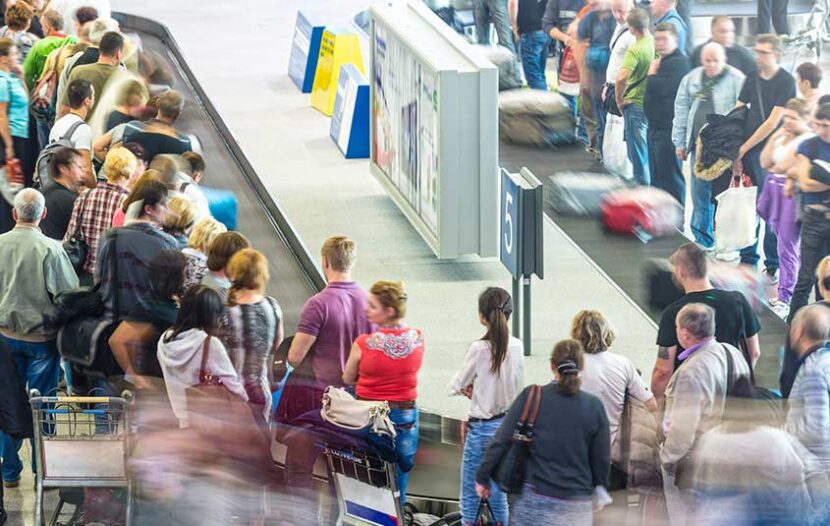Starting next week, passengers no longer need to be fully vaccinated to board a plane or train in Canada, leading to forecasts of further travel surges — and congested airports.
The federal government announced Tuesday it will scrap vaccine mandates for domestic and outbound passengers, effective Monday. The move will also lift vaccination requirements for federally regulated workers, allowing airline and airport employees on unpaid leave to go back on the job and ease the labour crunch behind long security and customs queues.
Richard Vanderlubbe, CEO of travel agency Tripcentral.ca, said he expects demand for vacation packages to rise by 10 per cent due to the move, which could vault his business close to 2019 customer levels.
“Canada’s one of the last places if not the only place that has this rule,” he said in an interview, arguing that “fear of the unvaccinated” is fading.
Nonetheless, a small segment of Canadians may be more reluctant than ever to get on a plane or train, given their neighbouring passengers or nearby workers may never have been jabbed, Vanderlubbe said.
“There still are some people sitting on the sidelines … the ones that are really cautious,” he said. “But as things improve in restaurants and gyms and workplaces, perhaps people get more confidence.”
Masks will still be required on board, and full vaccination remains mandatory for foreigners entering Canada, federal ministers said at an Ottawa news conference.
Dr. Zain Chagla, an infectious diseases physician at St. Joseph’s hospital in Hamilton, Ont., says vaccine mandates have outworn their purpose and fallen out of step with provincial guidelines that allow mass gatherings at sports and entertainment events.
Chief public health officer Dr. Theresa Tam has said cabinet should re-evaluate vaccination measures given that vaccines now provide less protection against transmission. And public health officials have said repeatedly since the Omicron variant hit in late 2021 that the virus was more adept at transmitting between vaccinated people than its predecessors.
Tuesday’s announcement came after Ottawa paused randomized COVID-19 testing of vaccinated passengers, starting last Saturday through at least June 30, following industry demands to process travellers more quickly. It also comes after the U.S. nixed its rule that all travellers entering the country present a negative test.
Kelly McDonagh, a 52-year-old Toronto-area resident, said the end of travel vaccine mandates would not discourage her from hopping on a plane.
“I think you have to live life. You still have to take precautions but continue to enjoy yourself,” she said.
The only deterrent might be her “unacceptable” travel experience Monday, when her flight from Chicago to Toronto’s Pearson airport was delayed nearly three hours before being cancelled.
McDonaugh managed to book herself on an evening flight, paying a second fare. Had she waited for Air Canada to rebook her like most of her fellow travellers, she would have returned on a 9 a.m. flight the next day with a four-hour layover in Connecticut, she said.
“Other people were in much more dire situations. They had connecting flights, they had to get home for work, they had to pick up kids. So people were really upset,” she said. “It’s getting out of hand.”
The government’s decision to cut steps that confirm vaccination status at the departures area will speed up the flow of passengers headed out of the country, said Marty Firestone, president of insurer Travel Secure. But the surge in domestic travel could be hard to for security screeners to handle.
“A huge uptick should happen immediately,” he said.
The millions of Canadians who remain unvaccinated may be less eager to travel abroad, since some countries — like Canada — require that foreigners be jabbed to enter, and they would have to self-isolate upon return.
“That 14-day quarantine is just not feasible for them,” said Wendy Paradis, president of the Association of Canadian Travel Agencies.
Canadians’ biggest travel destination remains Canada itself.
“With the summer season in front of us, the ability to travel across Canada is actually very significant for unvaccinated Canadians,” Paradis said.
“We always find that there is a certain amount of the Canadian public who are more safety-conscious, that it does take them longer to be comfortable travelling. But for the vast majority of Canadians, the easing of these mandates is only good news for them,” she said.
The National Airlines Council of Canada called Ottawa’s latest announcement an “important milestone,” but pushed for more rollbacks.
The trade group is demanding the government end the vaccine mandate for inbound travellers — in step with more than 100 countries — streamline the ArriveCan app to expedite customs processing and make the pause on randomized COVID-19 testing at airports permanent.
Treasury Board President Mona Fortier told reporters Tuesday reverting to vaccine mandates in the fall remains a possibility.

